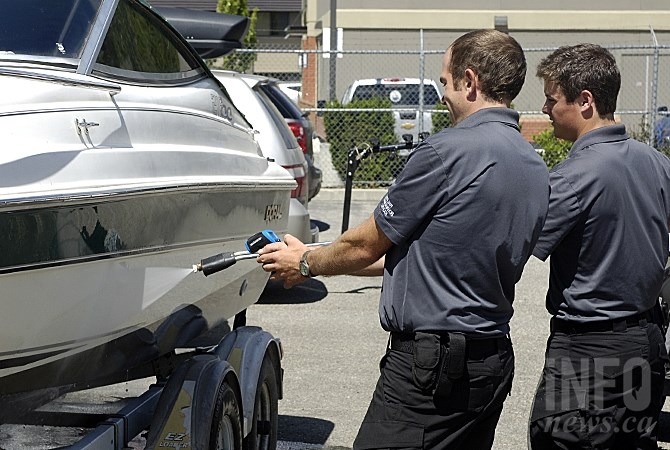
Conservation officers decontaminate a boat in Kelowna which was transported from mussel-infested Lake Eerie, Thursday, June 18, 2015. One officer sprays heated water on the hull while another measures the temperature to ensure the water is hot enough to kill any mussel larvae.
(ADAM PROSKIW / iNFOnews.ca)
June 18, 2015 - 8:00 PM
KELOWNA – Conservation officers in Kelowna decontaminated a boat today which came to the Okanagan from an Ontario lake known to be infested with invasive mussels.
The boat was purchased by someone in the Okanagan city and transported from Lake Eerie in Windsor, Ont. It was shipped along with another boat bound for Fort McMurray. Both went through an inspection station in Vermillion, where the Fort MacMurray-bound boat was found to be infested with the invasive species.
Sgt. Josh Lockwood with the B.C. Conservation Service says they were not about to take any risks with the second boat, which will eventually be used in Okanagan Lake.
“It comes from a high-risk lake but there’s low probability (of infestation),” he says. “Theyve done a look over it, they haven’t found anything, but they’ll decontaminate it anyway.”
The decontamination process, June 18, involved spraying the hull with high-pressure water heated to at least 140 Celsius.
“They also did an engine flush with hot water and that killed any of the larvae and any live mussels in the bilge.”
This is the first year B.C. has regularly checked boats and trailers for the mussels. The province has three portable decontamination units which can be shipped wherever they are needed. The unit used in Kelowna was shipped from Penticton earlier in the day.

Quagga and zebra mussels can be seen encased in plastic. The invasive species are wreaking havoc in lakes and waterways across North America.
(ADAM PROSKIW / iNFOnews.ca)
Lockwood says the dangers of the invasive mussels cannot be overstated.
“We just came back from Phoenix, Arizona on a certification course and the devastation there is unbelievable,” he says. “People are bringing their boats into the mechanics wondering why they’re not working and finding the water intake is completely plugged with mussels and everybody on the beaches down there are wearing beach shoes because the dead shells cut your feet. It’s really important we don’t get mussels in B.C.”
In late March the province provided $1.3 million in funding over a two year period to provide two-person, trained auxiliary conservation officer crews equipped to decontaminate mussel-fouled boats. The officers will also respond to problem boats discovered by Canadian Border Services agents.
An education campaign consisting of 24 new highway signs featuring the “Clean, Drain, Dry" message will be initiated at selected entry points into B.C.
“Pull your boat out, clean it, drain it, pull the plug out and keep it in dry storage," Lockwood says.
Meanwhile, Okanagan-Coquihalla MP Dan Albas says federal regulations have been brought into effect just in time for the arrival of boating season in the province.
"Our new invasive species regulations have been published in Canada’s Gazette and are now in force,” he says. “While there is more work to be done, it is rewarding to have these new regulations in place.”
Despite some close calls, there have been no zebra or quagga mussels found in B.C.
To contact the reporter for this story, email Adam Proskiw at aproskiw@infonews.ca or call 250-718-0428. To contact the editor, email mjones@infonews.ca or call 250-718-2724.
- This story was updated at 7:54 a.m., Saturday, June 20,2015 to correct the spelling of Fort McMurray.
News from © iNFOnews, 2015